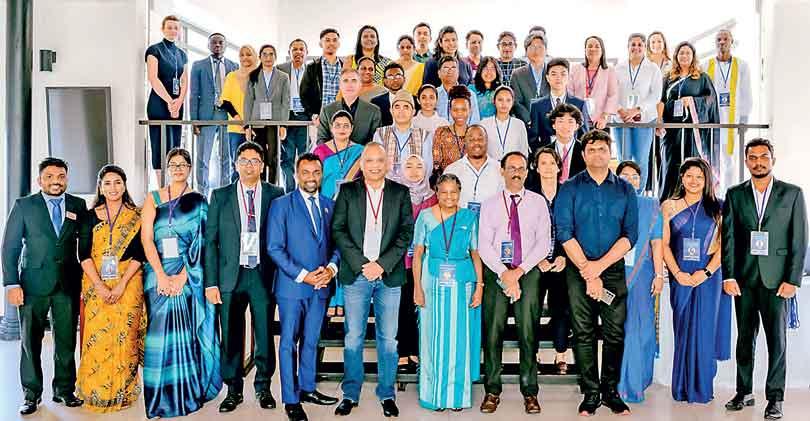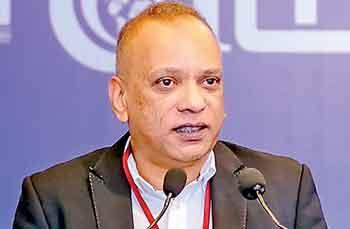20 Feb 2024 - {{hitsCtrl.values.hits}}

Participants along with distinguished guests pose for a photograph at the conclusion of the 08th International Conference on Climate Change, in Colombo on February 8 and 9
 “There is a crisis. Climate change is a crisis. There is no disagreement on that. In any part of the world, everyone would agree that a major crisis is taking place. Hence the main question here is; if there is a crisis happening, are we up to that standard to combat this crisis,” questioned Professor of Climate Change Impacts and Coastal Risk Dr. Roshanka Ranasinghe when he delivered the Keynote address at the 08th International Conference on Climate Change held in Colombo on February 8 and 9.
“There is a crisis. Climate change is a crisis. There is no disagreement on that. In any part of the world, everyone would agree that a major crisis is taking place. Hence the main question here is; if there is a crisis happening, are we up to that standard to combat this crisis,” questioned Professor of Climate Change Impacts and Coastal Risk Dr. Roshanka Ranasinghe when he delivered the Keynote address at the 08th International Conference on Climate Change held in Colombo on February 8 and 9.
Dr. Ranasinghe informed the audience of the key messages on sea level rise and regional climate change and its implications to Sri Lanka during his presentation. The conference on climate change comprised an eminent hybrid platform of researchers, scientists, academics and industry experts representing Sri Lanka, Brazil, India, China, Poland, Cameroon, South Africa, Mexico, Malaysia, Japan, Switzerland, Nigeria, Korea, Spain, Bangladesh, Italy, Philippines, Indonesia, Canada, Thailand, Portugal, Pakistan, Germany, Australia and the U.S.A. The conference presented an opportunity to participants to share experiences, discuss research findings and the desired knowledge for practical exercise.
“Resources and the right timing to take proper action are the key elements in battling climate change. However, the main problem I see when tackling climate change is the sense of urgency. Do we have a sense of urgency? This involves making strategies and policies with regard to making sure cities become more resilient and sustainable. It is also important to oversee thorough assessments of risks and vulnerabilities the system faces and establish a successful strategy towards combating climate change. This should be done using robust data in terms of developing flexible measures that can be used over time along with the adequate resources, including financial and technical support. However, the other issue here is we don’t get the expertise we need. We don’t get the technologies we urgently need and we certainly don’t get the financing at the required speed, as it takes years and years of negotiation to access climate financing,” stressed Prof. Dr. Ranasinghe.
Climate-friendly forms of agriculture
Human activities being the vital reason for climate change, primarily due to the burning of fossil fuels which produces heat-trapping gases, the individuals representing their state imparted enlightening presentations to reduce such activities and conserve a better environment. The presentations by each participant comprised the different consequences of climate change and a few ways to resolve them with the emphasis on the vital role of sustainable lands while protecting forests and wetlands to form climate-friendly forms of agriculture.
University Distinguished Professor, Colorado State University, United States Prof. Keith Paustian later concluded the session by speaking about reimagining agriculture in a new paradigm for soil help and climate change mitigation. He stated that the agricultural sector is responsible for at least 30 percent of the global anthropogenic emissions (The emission of greenhouse gases caused by human activities which include by burning of fossil fuels, deforestation, waste management and industrial processes) by saying “The agricultural sector is responsible for roughly 30 percent of global anthropogenic emissions. This is largely due to the loss of soil organic matter from the conversion of native ecosystems to agroecosystems and from the manufacturing and use of chemicals. However, with effective management and sustainable practices, agriculture has the potential to be a key player in mitigating climate change,” said Prof. Paustian.
The international conference educated the individuals present and allowed them to learn about climate change taking place around the globe. The individuals were also thrilled to share and discuss ideas while working together during the networking sessions that took place at the conference. Through this exercise, the individuals were presented with the opportunity to bond with individuals around the world while enhancing their views on climate change.
 “Resources and the right timing to take proper action are the key elements in battling climate change. However, the main problem I see when tackling climate change is the sense of urgency. Do we have a sense of urgency”
“Resources and the right timing to take proper action are the key elements in battling climate change. However, the main problem I see when tackling climate change is the sense of urgency. Do we have a sense of urgency”
- Dr. Roshanka Ranasinghe Professor of Climate Change Impacts and Coastal Risk
04 Jan 2025 3 hours ago
04 Jan 2025 3 hours ago
04 Jan 2025 4 hours ago
04 Jan 2025 4 hours ago
04 Jan 2025 5 hours ago